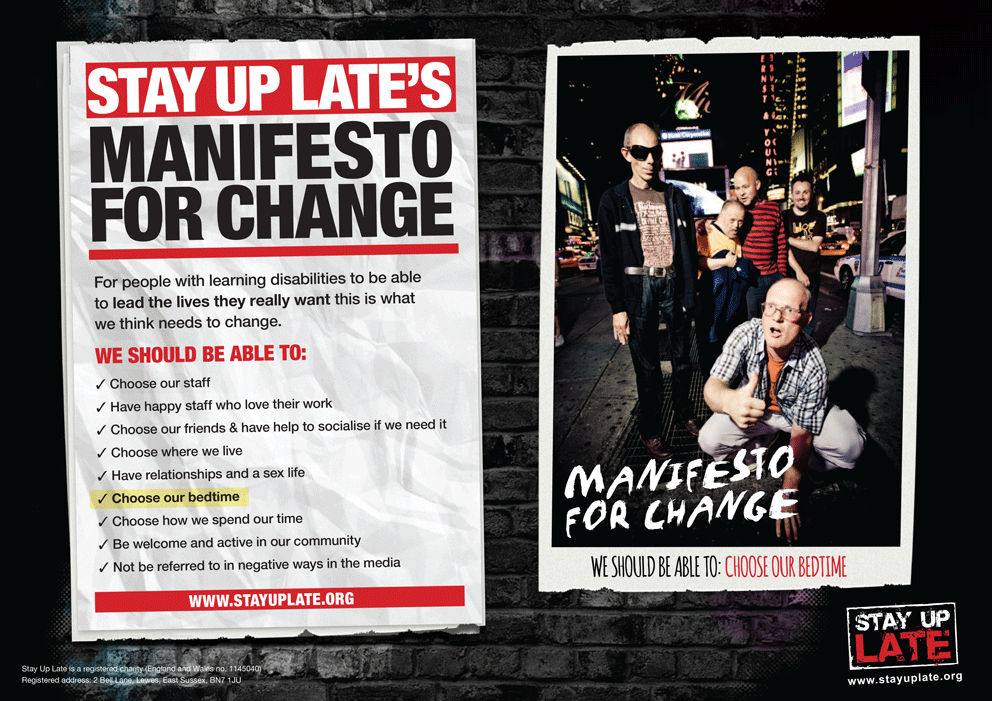Thank you to Richmond Borough Council who we met at the Learning Disability Today Conference in London in November ’13..
They invited us to pick up the work we started at the Bild and Learning Disability Wales conferences so we ran a shorter session picking up on four of the key blocks we’ve identified which are getting in the way of people with learning disabilities leading great lives. These are the thoughts and ideas that came back from the table discussions at Richmond Borough Council’s Learning Disability Forum.
Commissioning
The views in the room at BILD and Learning Disability Wales were that too many services designed by officials in local authorities and that there needs to be strong shift towards proper co-production of services. The question we posed around this was:
Q) How can we create a commissioning system which encourages flexibility and promotes co-production?
The suggestions were:
- Involving people with support needs to steer how their support is planned. The very starting point of commissioning needs to be to find out from people what they want to do.
- Develop a strategy to keep the cost of commissioning low and develop support groups to also include families, volunteers, friends and seeking to tap in to lottery and charitable funding to support this.
- Having a more networked approach and linking people of similar interests in to support services.
Risk and fear of scrutiny
The views from our previous workshops were that there was too much of a culture where life is prevented from happening for people due to risk assessments, the fear of litigation, a blame culture within individual services (and wider) and generalised ‘health and safety issues’. So the questions we considered were:
Q) How can we share risk?
Q) How can we be positive about risk?
Q) What is the risk of not having a great life?
The suggestions were:
- Training, and assessing needs of support staff in support the behaviour of people with learning disabilities.
- A much better approach to planning risk assessments
- There’s a lack of understanding from the general public, and their opinion can have an effect on limiting access to mainstream activities and services. This needs addressing.
- It’s a natural response to the safe guarding procedures
- There’s also sometimes difficult relationships to manage within the Borough and with families.
Inadequate support provision
The views from our previous workshops were that the main issues here were:
- Lack of suitable housing
- Constant re-organising of services
- Lack of funding and poorly paid staff
- Inadequate staff cover at weekends
- Austerity cuts to services
We added a word of caution here too as it’s very easy to get drawn in to a discussion about the damaging effects of austerity on frontline services but this isn’t something we can influence and it feels like a better use of our time to talk about things that may be in our control. So lets save discussions about austerity for the pub! It’s obviously a hugely important and damaging issue, but time was limited and we wanted to have a discussion about other things.
The questions we asked the group to think about were:
Q) How can we create a shift from service to community?
Q) How can we give people with learning disabilities more info about how their money is spent?
Q) How can we ensure the proper use of personal budgets?
Q) How can we increase the profile of support workers and add value to their role?
The suggestions were:
- Creating restrictions on shared support and more use of individualised support.
- More use of ‘natural support’
- Recruiting the right people
- Creating a better match between the person’s needs and the type of support that would suit them best
- Spread the net across home and organisations to share support for people with similar interests
- Have good risk taking
- Match skills and interests between staff and service users
- Create a culture of good will
- Recognise that emotional well-being is as important as physical well-being
Work cultures
The general feeling coming out of our previous workshops was that the main blocks here were inflexible staff, disinterested staff, rigid rotas, managers who don’t create positive cultures and people who ‘think inside the tick-box’.
So the questions considered here were:
Q) How do we get the right staff?
Q) How do we enable managers to create positive cultures?
Q) How do we challenge poor cultures?
Q) How do we involve people with learning disabilities in checking quality?
Q) How do we involve people with learning disabilities in establishing the culture in their home?
Suggestions were:
- Matching interests between service users and staff – and adopting One Page Profiles as a way of matching people and creating equality
- Matching staff across services, viewing staff in bigger providers as a resource that can be utilised for their skills and interests across a number of services.
- Creating a culture of flexible staffing led by managers and changing cultures around rotas, seeing them as tools that enable things to happen, not prevent them.
- Getting a lot better at managing risks, and supporting the taking of risks.
- Challenging cultures – with mangers taking a leadership role in enabling this to happen
- Just simply getting better at planning in advance
- Making better use of available resources, and making these free for carers and other charities
- Getting better at motivating staff, encourage their ideas and feedback
- Incentivise and sell-it. Find ways to share positive stories and ideas where support staff have enabled cultures to change, and people to lead the lives they want through case studies and good news stories, turning the theory in to reality.
- Recruitment – a lot needs to be done around this from getting the right staff contracts through to the involvement of people with learning disabilities in the selection of their support staff.
Next steps
The idea of our ‘manifesto for change’ has become a bit of a labour of love for us, it’s not something we’ve had any funding to develop yet but is something we feel passionately about. The whole charity was founded on the notion that we need to find ways to improve the lives for people with learning disabilities and importantly in a way that they’re leading.
The discussions at Richmond were great to hear as the general consensus was that most of these issues are in our control to change but will need some bravery and culture change amongst commissioners and support providers to enable a shift of power from them to people with learning disabilities, who are the best placed people to say how they really want to be supported.
For me one of the most important things that came out of this session was that everyone in the room said they believed that things needed changing, and that they wanted to be part of that process but we get the sense, from talking to people, that everyone is busy and working on their own area. It’s just too hard to find ways to share innovation and best practice across local authorities.
So we’re working on some ideas about how we might be able to go about enabling that to happen.
The manifesto for change
At the end of the talk I also gave a sneak preview of our Manifesto For Change, created through a number of workshops we’ve run over the past year.
(Click on the image to see it larger)
It’s still in draft but one of the comments made by a commissioner at Richmond was that providers may need support around all of the manifesto points which got us thinking on the train home about how we could develop a series of training workshops around each area.
So thanks to Richmond for an invigorating discussion and an idea for a new project!



